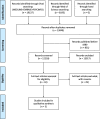Are mental disorders related to disbelief in free will? A systematic review
- PMID: 33726858
- PMCID: PMC7962299
- DOI: 10.1186/s13643-021-01621-9
Are mental disorders related to disbelief in free will? A systematic review
Abstract
Background: The nature and existence of free will have been debated for centuries. Since some psychiatric disorders are known to interfere with one's ability to control their actions and thoughts (e.g., schizophrenia), the investigation of the psychiatric facet of free will beliefs seems to be relevant. In this systematic review, we were interested in clarifying if and how having a mental disorder affects individuals' beliefs in free will by comparing psychiatric vs. non-psychiatric samples.
Methods: A systematic search of MEDLINE, Web of Science, EMBASE, and PsycINFO databases was performed between 04 and 09 November 2020. The search strategy included "free will" and related constructs and terms related to DSM-5 mental disorders characterized by psychotic, compulsive, avoidant, or impulsive symptoms. Eligible designs of studies included case-control and cohort studies. Study selection took place in committee meetings consisting of six researchers. Quality assessment of the selected studies was performed through the Joanna Briggs Institute Appraisal Checklist for Case Control Studies.
Results: After removing duplicates, a total of 12,218 titles/abstracts were screened. Inclusion and exclusion criteria were followed, and three articles were eventually selected.
Conclusions: It is not possible to provide unequivocal confirmation that having a mental disorder can or cannot affect someone's belief in free will. Studies with different mental disorders should be conducted in this field.
Systematic review registration: PROSPERO CRD42018109468.
Keywords: Belief in free will; FAD; FWDS; Psychiatric disorders.
Conflict of interest statement
The authors declare that they have no competing interests.
References
-
- Feldman G, Baumeister RF, Wong KFE. Free will is about choosing: the link between choice and the belief in free will. J Exp Soc Psychol. 2014;55:239–245. doi: 10.1016/j.jesp.2014.07.012. - DOI
-
- Tait G. Free will, moral responsibility and ADHD. Int J Incl Educ. 2003;7(4):429–446. doi: 10.1080/1360311032000122483. - DOI
Publication types
MeSH terms
LinkOut - more resources
Full Text Sources
Other Literature Sources
Medical


